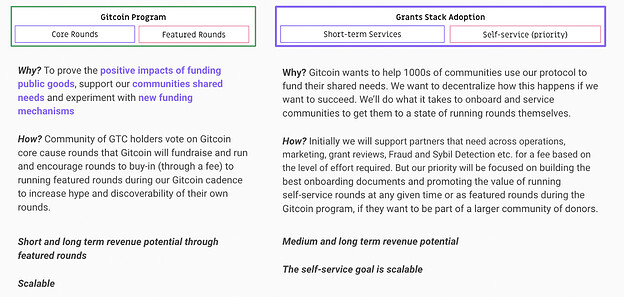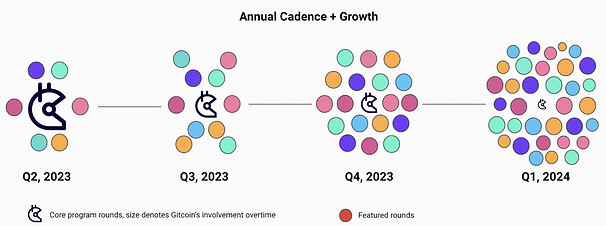Decentralizing Gitcoin’s Grants Program
Authors: Janine Leger, Scott Moore, Connor O’Day, Ben West, Maxwell Kanter, Madison Adams
Thank you this team and the whole of PGF and broader DAO contributors who helped thinking through this initial strategy. We’re still starting this journey and would love thoughts and feedback about how we’re thinking about the program.
TL;DR
The Gitcoin Program will start to decentralize over the coming months while continuing to fund public goods on a quarterly cadence. The Gitcoin Grants Program will consist of Core Rounds decided on by GTC token holders and core community members. Gitcoin contributors will run these core rounds (fundraise, operate, market and analyze for fraud/sybil). In addition, we encourage mission-aligned programs to run what we are calling “Featured Rounds” alongside the Gitcoin Core rounds for a fee. Featured Rounds will be independently run but will be marketed as part of the Gitcoin Program round and will benefit from market visibility.
Thanks to the entire PGF team for a lot of thought and effort that went into this approach.
Background
Over the last 3 years, Gitcoin’s Grants Program has been focused on helping sustain digital public goods that the Gitcoin and broader web3 community cares about. This journey has led us from funding everything from Ethereum infrastructure all the way to climate and open science.
As we shift to a decentralized protocol, we want to effectively decentralize our program. This means decentralizing its operations and finding ways to achieve long term financial sustainability with the help of the broader Gitcoin community. Now that we’re in the throws of a round on the protocol and so far we know it works, we want to take the time to outline the next steps we’re taking toward a decentralized, community-owned program.
Grants Program Definition
Previously, Gitcoin managed and ran all operational aspects for a combination of our Gitcoin main round (anything public goods related), cause rounds (rounds focused on a general cause with multiple funders, i.e., Climate Change) and ecosystem rounds (rounds focused on a project-specific theme, usually with one funder, i.e., ENS). These rounds were decided on by the Public Goods Funding Workstream (PGF) and then put to a community vote each quarter.
With the launch of Gitcoin Grants Stack, anyone will be able to launch and manage their own programs the same way we manage ours at any given time. In practice, the Gitcoin Grants Stack removes a major barrier to adoption and gives any ecosystem the tools to fund their own shared needs and become a manager of their own program, without relying on Gitcoin. In this world, our team will focus on two key initiatives - setting up the Gitcoin program (core grants rounds our community wants to fund) and separately driving Grants Stack (anyone using our existing dApps to fund their community’s shared needs).
For the purpose of this post, we’re going to dive into details for the Gitcoin Program and not the details of how we’re going to drive protocol adoption. In the short to medium term Gitcoin will solicit feedback from our community about core rounds to run every quarter that fund public goods and encourage other communities to run rounds that align with the public goods ethos alongside these Gitcoin core rounds as “featured rounds”. These rounds will benefit from a discoverability standpoint and the network effects of many rounds happening at the same time. Unlike our centralized grants platform, the eventual goal will be that the program consists of a festival of public goods funding rounds all running independently on Gitcoin Grants Stackat the same time in support of public goods. This would mean that regardless of the PGF team, public goods will be funded and likely at a scale way larger than we could achieve if we owned every round.
At least to start, Gitcoin itself will be the largest round manager of these core Gitcoin program rounds. In the next few weeks we will share the different public good cause rounds we’ve run in the past or seen interest from funders, round managers and grantees for our community to vote on. We will ask community members to provide suggestions on which 4-5 rounds to prioritize as core rounds for Gitcoin to fundraise for, operate and market.
In addition, we are seeing programs interested in running their rounds at the same time as our core round and these will be the “Featured Rounds” that organizations run themselves but are profiled alongside our Gitcoin core program rounds.
It’s important to understand the program in this context, and to look at the kinds of rounds this new world enables.
In summary, the Gitcoin Program will consist of two elements:
- Program Core - Gitcoin does fundraising, operational and full marketing support to start and ideally over time, we will decrease the fundraising and operational lift.
- Program Featured - Programs that apply and, if accepted by the community, buy-in to run a round at the same time as the Gitcoin Program to receive additional exposure to new grantees and donors, where Gitcoin provides marketing and customer support but the round is fundraised for and operated by the Program Manager (company, DAO, cause, NGO etc.).
In more detail:
Program Core Round(s) would be a very limited set of recurring thematic rounds most aligned with the Gitcoin DAO’s community and mission
- For example this could include rounds we’ve seen large support for including OSS, Eth Infrastructure, Climate, Decentralized Science, DEI (Diversity, Equity and Inclusion) etc - or only OSS if that is what our broader community votes on
- GTC token holders will have full agency over which core rounds we run, how much funding we give to each from the Gitcoin Multisig, round eligibility, and structure of core rounds
- Gitcoin full time contributors (i.e., PGF and MMM) will be the round operators and marketers for Core rounds and FDD contributors will support fraud and sybil detection
- Core rounds can change each quarter but relative consistency is a goal to strive for. As these core rounds mature, they can also graduate to featured rounds with community members stepping up to run them. We’re already starting to see this happen with the climate round.
Program Featured rounds will be where we encourage a subset of communities who align with Gitcoin to run their own rounds as part of our Gitcoin Grants Program Festival like experience (Gitcoin’s quarterly program cadence) and in turn benefit from the round marketing, Gitcoin brand and full endorsement. Over time we hope communities are encouraged to join the festival of rounds and we further decentralize how we scale funding public goods.
- Featured rounds run alongside core rounds, but can have independent round managers
- These include cause rounds, thematic ecosystem rounds, aligned community Ecosystem rounds
- Communities and ecosystems will pay a fee to be included as featured rounds as benefits include being a visible round on the program webpage, marketing, exposure, priority support, basic Sybil reviews, etc
- GTC token holders may veto a featured round if they don’t think it’s in line with the Gitcoin Ethos of funding public goods in web3 and beyond
- GTC token holders do not have agency over funding, eligibility, and structure of featured rounds, that is up to the round managers
- Featured rounds have the option to run as meta-rounds to the core program
- Dependent on future deployment of meta-round functionality
- Featured rounds will receive minimal onboarding support, marketing support and general support
- Additional services will be limited (and more expensive due to team constraints) during the Gitcoin Program rounds
- In the near term, what we have historically called “jet-engine QF” whereby a grantee who receives funding in one round, receives matching funding from any other round they are in, will not exist. However, grantees project pages will profile all the different rounds they are in for discoverability
Continuing to run our Gitcoin program does a few key things:
- It allows us to experiment and showcase best practices for round managers
- Generate fees from funds raised that help us reach financial sustainability
- Demonstrate how funding digital public goods can benefit the broader ecosystem
- Creates network effects for creating a culture in crypto of funding public goods
- Provides opportunities for more communities to test the protocol and potentially see opportunities to build on it
- Creates consistent funding for meaningful projects in our ecosystem
- Creates a consistent cadence that incentivizes people to run rounds during
Gitcoin was one of the first projects in the crypto space to double down on funding public goods and we want to not only continue what we were doing to promote funding public goods but significantly amplify doing so with the protocols. A big reason why we’re charging for featured rounds is to create a state of program sustainability vs operate the Gitcoin program as a non-profit and constantly be in a state of fundraising. We hope that charging for Featured Rounds will overtime cover costs and if we reach profitability we would be committed to putting those funds back into public goods.
Wen Program Launch?
We hope to launch the program in early April, share more about the Program at EthDenver and will start engaging GTC token holders in Core Round decision making in the coming weeks once we conclude the Gitcoin Alpha Rounds.
Thanks for reading and look forward to your thoughts and feedback.

